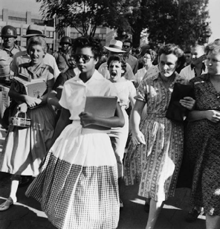Lorch's wartime observations of racial inequality—the black soldiers at Rogers Field who were overqualified to mop floors; the black companies on troop transports who always seemed to do the dirty work—only reinforced his sense of outrage. So when he was hired as an instructor at City College of New York, he took a public stand against racist practices

A new middle-income development had been built on Manhattan's First Avenue, largely to house returning veterans. It was called Stuyvesant Town, and there was no shortage of applications. Lorch was aware that its owner, the Metropolitan Life Insurance Company, had a strict "no Negroes" housing policy, going so far as to refuse to accept applications from non-whites. "There was talk of a boycott, but that was quixotic," says Lorch. "Met Life would have gotten the tenants it wanted." So instead, he and others intended to change the policy from the inside. Lorch moved into Stuyvesant Town with his wife, Grace, and infant daughter, Alice. He became vice chair of the Tenants Committee to End Discrimination and took the fight to both the courts and the court of public opinion. "We lost all the way up to the Supreme Court, but maintaining the struggle in the public eye brought eventual success," says Lorch. "We had one advantage—all the publicity about Met Life's policies was affecting business. At the time, they wrote 75 percent of the life insurance policies held by blacks—of course, at discriminatory rates. But things went so bad for them that they had to close their Harlem office. So there was leverage."
But the publicity cost Lorch his job. In 1949, the promotions committee of the CCNY math department recommended that he be elevated to assistant professor; instead, he wasn't reap-pointed—a move seen by many as a reaction to his activism. An investigation was called for by the New York Chapter of the NAACP, the American Jewish Congress, and the Teachers Union. One student, Leonard Gross, led a small delegation into City College President Harry Wright's office to protest the firing. "He talked politely, but in effect he told us we wouldn't understand these things," says Gross, a math professor at Cornell since 1960. "He didn't strike me as a straightforward man." Although Wright told the New York Times that "Dr. Lorch's teaching qualifications had not been questioned," he also stated simply, "Sometimes you have to do things in this life which you don't care to explain."
And so it began for Lee Lorch: the road to exile.
Lorch mentored some of the first African American women to earn PhDs in math. 'He refused to see a color or sex line,' said the late Etta Falconer, 'and for this reason has profoundly affected the development of many persons who would otherwise have carried out the low expectations of the time.'Lorch found another job, this time as an assistant professor at Penn State University. Eight months later, after he was again recommended for promotion, he was informed that his contract would not be renewed. Lorch argued that administrators were unhappy with his refusal to answer questions about his former associations and his civil rights efforts; he claimed that Penn State's provost called his attempt to integrate Stuyvesant Town "extreme, illegal, and immoral, and damaging to the public relations of the college"—ironic, given the negative attention Lorch's dismissal engendered. This time, there were objections from organizations ranging from the Liberal Arts Student Council to the Pennsylvania AFL-CIO. In an editorial, the Times opined that "academic freedom is really imperiled if a professor is to be penalized because he takes a firm and positive stand against racial discrimination." Seventy-year-old Albert Einstein joined the chorus of protesters, too, inviting Lorch to visit his house in Princeton.
Imagine a minor league outfielder being asked to chat with Ted Williams at Fenway Park; such was Lorch's eagerness and trepidation. When he arrived at the house, Einstein's longtime secretary answered the door. "I need your help," Lorch told her. "I don't know how to behave."
"Don't worry," she replied. "He's really interested in seeing you."
Saying he knew better than to rely entirely on newspaper reports, Einstein quizzed his guest about the details of the Penn State situation. "We chatted about the Cold War and this and that. And while I was there, he wrote a letter to Penn State and gave it to me to bring back," Lorch recalls. "I suppose I was on Cloud Nine."
He was also unemployed, as Penn State refused to reverse its decision. So Lorch moved on, opting for a position at a historically black college—Fisk University in Nashville, where he mentored three students who would be among the first African American women to earn doctorates in mathematics. "He refused to see a color or sex line," said the late Etta Falconer, who graduated summa cum laude from Fisk and went on to such a celebrated career as a professor at Spelman College that a campus building was named after her, "and for this reason has profoundly affected the development of many persons who would otherwise have carried out the low expectations of the time."
However, soon after Lorch's hiring at Fisk, his principles were tested again. When Lorch and three black colleagues attended the Southeast regional meeting of the Mathematics Association of America, they were informed that they would not be allowed to attend the closing banquet at a whites-only hotel. Lorch sent a letter to the Board of Governors of the MAA, and two years later the organization adopted a policy against holding events in discriminatory establishments.
 But once more, he lost his job. This time, the catalyst was the Lorches' attempt to enroll their daughter in an all-black neighborhood school bordering Fisk. Although it followed on the heels of the Supreme Court's Brown v. Board of Education decision, Lorch was called before the House Committee on Un-American Activities. His refusal to cooperate was interpreted by Fisk President Charles Johnson as "tantamount to admission of membership in the Communist Party." Johnson was African American and had celebrated Lorch's courage upon hiring him, but this wasn't about black or white—it was about the Red Scare. Although more than two-thirds of the faculty and 150 alumni urged Fisk's Board of Trustees to retain Lorch, he was fired in June 1955.
But once more, he lost his job. This time, the catalyst was the Lorches' attempt to enroll their daughter in an all-black neighborhood school bordering Fisk. Although it followed on the heels of the Supreme Court's Brown v. Board of Education decision, Lorch was called before the House Committee on Un-American Activities. His refusal to cooperate was interpreted by Fisk President Charles Johnson as "tantamount to admission of membership in the Communist Party." Johnson was African American and had celebrated Lorch's courage upon hiring him, but this wasn't about black or white—it was about the Red Scare. Although more than two-thirds of the faculty and 150 alumni urged Fisk's Board of Trustees to retain Lorch, he was fired in June 1955.
Lorch turned to tiny Philander Smith College in Little Rock, Arkansas, where he became chair of the mathematics department—in fact, he was the math department. Two weeks later, Grace Lorch wrote a letter to the local school superintendent asking that eleven-year-old Alice be allowed to attend the same institution as her new friends. "Since we live at 1801 High Street, located in a Negro neighborhood, this would be a Negro school," she wrote, adding that it "might also provide a useful and unobtrusive example of benefit to the process of integrating Little Rock schools." The request was denied.


